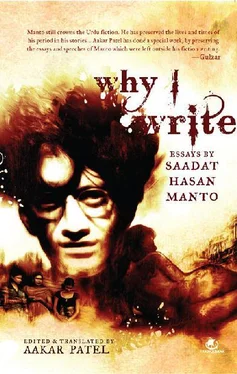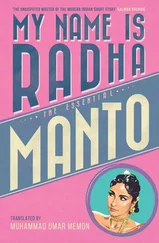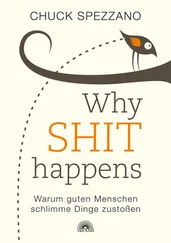‘What is this?’ I asked.
‘This is the thing that brought us here,’ he said.
When I insisted on seeing it, he held it firmly in both hands and held it up, saying: ‘Read it.’ I quickly scanned it to learn that other than a search, the document was also an order for my arrest.
And immediately my thoughts turned to sureties and bail. The officers were stubborn and refused to accept any of those present as sureties. My nephew was a gazetted officer, and so was my brother-in-law. ‘You’re servants of the government,’ they were told, ‘you could be dismissed for this.’
Anyway, I was arrested and then granted bail and now I would have to go to Karachi and face another court of law. In past cases, I had submitted a doctor’s note certifying that I was too unwell to attend, but that was over now.
One interesting footnote:
I looked for someone to bail me out but none of my friends could be found in their homes. In the end, I went to Mohd Tufail, a good man who bailed me out. He is the owner of Naqoosh of which he is also the editor. He put up all the books in his store as surety, which was for Rs 5,000.
Another interesting footnote:
Tufail saheb put up the surety but wasn’t convinced that I would show up in court. It’s true that I didn’t have money to poison myself even if I had wanted to, leave alone make the trip. Tufail saheb came to my place, the day I had to go to Karachi, at 5 in the morning. He had with him two second class tickets. He was sending a friend of mine, Nasir Anwar, with me so that I would get to Karachi without fail. He came to drop us in a tonga and remained on the platform till the train left.
What happened to me in Karachi, I’ll tell you some other time. Because at the moment I’m too unwell to write further.
— (Originally published as Paanchvan Muqaddama (I))
This is the second essay Manto wrote on his fifth trial for obscenity. It was the last time the State would harass him, and he would die soon after the trial. The piece was published after Manto was dead.
In a previous issue of Naqoosh (February-March 1953) I had begun to write on this subject but wasn’t able to finish it because I was really unwell. I’m actually still unwell and feel I’ll always remain this way. Some say this illness defines me — they mean the madness of my writing.
After I wrote that first piece, Mr Tufail, owner and editor of this magazine, published an essay of his own, titled “Mr Manto”. Based on this, Ahmed Nadim Qasmi, who has unfortunately been appointed editor of Imroze , wrote a piece on me titled: “The Critic”.
Mr Tufail’s essay is in my opinion, quite personal about me. Some of the things he’s written shouldn’t have been made public. No man is without his weaknesses, but why put them on display? It’s true that personal trivia about writers and artists is always interesting to read and reveals something about their character. But what’s the point of such revelation when it brings the writer into disgrace?
On examination, it’s clear that whatever he may have written, Mr Tufail’s intent was not to do this. However in his emotionally-charged piece, he said things that ought not to have been said — or said in this manner.
On reading it, I wrote him this letter:
Biradaram! (My brother) — As-salaam-alekum
Last night Safiya told me you’d written a piece on me in Naqoosh . I couldn’t read it properly, as I was very drunk. Safiya liked the piece and so read out some bits to me. I found it offensive. I let off a volley of abuse against you and then was I able to sleep.
When I read it in the morning, I found I actually liked it. I cannot deny what you’ve written is true. I’m happy you showed no hesitation in writing this way about me.
Whatever I am, may be found in this piece of yours — and there are some things in it that may have been in me, though I cannot feel them.
Humbly
Saadat Hasan Manto
I don’t want to say anything else about the piece. What is true, I cannot escape. If I drink, I can’t deny it. If I’ve borrowed money from someone, that also is a fact. If because of such things I am thought of as a bad man, that’s fine. If I had bothered constantly about how the world saw me, I couldn’t have been the author of a hundred stories.
Mr Qasmi, after reading the essay, wrote in his piece: It’s true that personal trivia about writers and artists is always interesting to read and reveals something about their character. But what’s the point of such revelation when it brings the writer into disgrace?
I don’t know whether Mr Tufail’s essay has left me in disgrace. Anyway, let’s carry on with my story. As you may have known from reading my earlier piece, this is the fifth time I was being tried for obscenity.
My friend, Nasir Anwar and I reached Lahore station. Mr Tufail had already bought us tickets, what remained now was to get seats. We also had the problem of carrying many beer bottles which also needed seating and there was no space in the train for them either.
I remembered an acquaintance, Yaqub Taufiq, was assistant station master here. It turned out he was on duty. He quickly arranged for a couple of seats and we were off to Karachi.
The compartment we were in also had a maulvi in it. He was fingering his beads and it looked as if things might get uncomfortable. To resolve the problem, I said to Nasir: ‘Yaar, pass me a beer.’
He reached under his seat and, opening one bottle, handed it to me. Maulvi saheb got off at the next station, still fingering his beads. This reminds me — at Lahore station, a man and his wife walked into our compartment. As they looked around for their seats, I said to the man: ‘Look sir, we’re drinkers. We are carrying fifteen bottles of beer. We’ll get drunk and talk shit. You’re clearly a good man, and apparently with your wife. It’s better you go to another compartment.’
Now, as I’m writing this, Mr Tufail, who had come to ensure we boarded the train, remembered something. That man and his burqa-clad wife went to the station master and told him about the two ruffians in their compartment. The station master was surprised and said that he was talking about Saadat Hasan Manto, a thorough gentleman.
The man said: ‘No, sir, that fellow referred to himself as a drunk.’ Anyway, apparently they were given seats elsewhere and we were rid of them.
The journey to Karachi was disgusting, even in second class. The compartment was full of dust. It was only thanks to the beer that the ride was tolerable.
I had wondered about a hotel to stay in but, as usual, had no money. In any case, my wife had insisted: ‘You must stay with my brother.’ I pondered over the line: Saari khudai ek taraf, joru ka bhai ek taraf. So I set aside the whole world and went to the wife’s brother.
He was a decent man, had a good job and an enormous flat. He welcomed us with great warmth and gave Nasir and me the flat next door to his.
Now I had no desire to stay in Karachi. After fifteen years in Bombay, this place had nothing new for me. The next morning, we went to the magistrate’s court. It was an ordinary building in which sat the additional district magistrate in a smallish room.
I’d faced courts in Lahore and was familiar with their customs and culture. That is to say, I knew they were places where there was absolutely no culture.
I stood before the magistrate with hands crossed in front. He saw me and asked: ‘What do you want?’
I was astonished by his politeness. I said: ‘Sir, my name is Saadat Hasan Manto. You’ve summoned me for my essay “ Oopar, Neechay aur Darmiyan” on the charge of obscenity under Section 292.’
Читать дальше












